FILIGREE: A Norma Morales Mystery
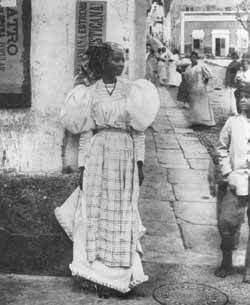
The story begins when Antonia Rivera Ramirez, daughter of an aristocratic family, is found dead in a side street in the old city of San Juan, just moments after a violent quarrel with her brother's dark skinned lover, Malú. But does it? Malú's best friend Norma is a laundress, a bakery assistant and a part time radical journalist for a seditious newspaper. She joins forces with Malú's privileged lover Josema to find out who really killed Antonia. The search takes them into all the crevices of island society, from hushed parlors where genteel ladies sip coffee, to small town garrisons, remote mountain shacks where coffee workers scratch a living, through the laundry rooms of wealthy families where servants gossip about family affairs, and deep into the violent secrets of the past.
You can browse Norma Morales' world on her Pinterest page.
Prologue
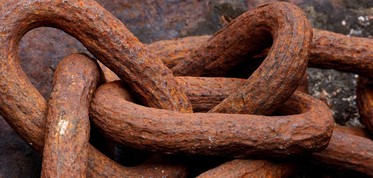
At the edge of the lower pasture, where it slopes toward the river that was once called the Toa, there is a place where the bones of the enslaved turn slowly to limestone under the lush grass. No one has broken the roots with a shovel for thirty years. There are no stone markers to tell a stranger who is buried here. Their names are in the parish books, but no one reads them. Those who would can't read. Only a few old women and men visit the graves. The others who would, live now on the newer haciendas of the Family's next generation, or have found work as servants or craftspeople in the city.
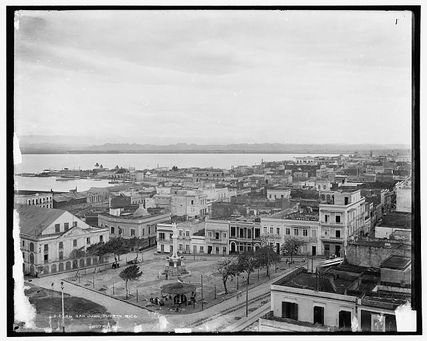
It is an old city, one of the oldest in the Americas, but it wears a new face these days, so full of bustle it’s bursting at the seams, desperate to expand. The flickering light of gas lamps is giving way to the steady glare of electricity. There is a telegraph office where you can read cables all the way from London, by way of Jamaica and Havana. A person can ride a train from the foot of Martin Peña Bridge, west along the coast, between pastures of red cattle and fields of sugar cane, past strange white hills full of fossils and bats, and the scattered teeth and broken pots of the first people, all the way to Arecibo and beyond.
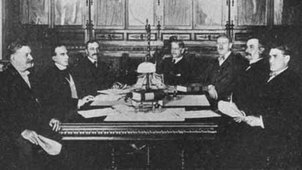 US appointed cabinet, 1900.
US appointed cabinet, 1900.
These days there is a lot of argument about progress and tradition, freedom and the responsibilities of civilization, a lot of warm moist air being expelled from a great many lungs under white starched shirts and elegant waistcoats. New cabinets of distinguished sons of this and that wait breathlessly to take office, pacing up and down in spacious, well-furnished rooms, practicing their acceptance speeches.
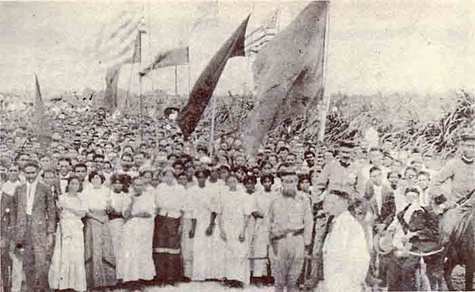 Marching workers.
Marching workers.
Talk of freedom or obedience is also moistening the air in less refined places. In the tobacco shops where deft handed men strip the big leaves and roll them into cigars, where tuberculosis and socialism travel from mouth to mouth on a breath. In the plazas where women sit cross legged behind their wares, cascades of flowery mundillo lace, piles of newly dug batatas and other roots, sugary white and brown coconut candies, and pots of steaming tripe stew. Among the porters who carry goods and news to and from steamships and sailing ships tied up at the docks.
Talk gathers in the yard where a young servant named Luisa, too big with child by the patrón's son to squat with the other laundresses and beat those white shirts against washboards anymore, has started on her journey toward the soapbox. Soon she will read dangerous books aloud to cigar makers, unfold the secrets of sex for young women ignorant of what awaits them, and preach that salvation lies in liberation, and Christ’s fiery teachings burn again in the mouths of anarchists. Soon she will be overturning more than tubs of soapy water. Talk hums in the girls’ school where Doña Ana Roque has been training young women to be printers, and swirls round the desk where she edits the feminist journal La mujer. It crouches in the hiding places of exiles preparing to slip away to the rebel swamps of Cuba, and in back rooms where seditious journalists pen outlawed commentaries for yet another banned newspaper.
Talk gathers in the yard where a young servant named Luisa, too big with child by the patrón's son to squat with the other laundresses and beat those white shirts against washboards anymore, has started on her journey toward the soapbox. Soon she will read dangerous books aloud to cigar makers, unfold the secrets of sex for young women ignorant of what awaits them, and preach that salvation lies in liberation, and Christ’s fiery teachings burn again in the mouths of anarchists. Soon she will be overturning more than tubs of soapy water. Talk hums in the girls’ school where Doña Ana Roque has been training young women to be printers, and swirls round the desk where she edits the feminist journal La mujer. It crouches in the hiding places of exiles preparing to slip away to the rebel swamps of Cuba, and in back rooms where seditious journalists pen outlawed commentaries for yet another banned newspaper.
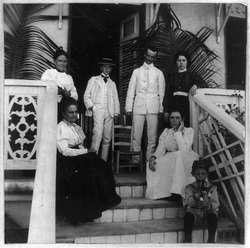
Talk fills the parlors where the members of ladies' charitable societies agree that working women are not yet fit for self-rule, and need instruction in morality and hygiene. Talk fills the private rooms of royalists shuddering at the specter of criollo government, and the verandas of well bred families of every stripe, aghast at the ever-present possibility that the African taint will enter their pure bloodstreams through the daughter or son who, swept up in a fever of liberal ideals and unruly passion, will cross the wall that separates caste from caste.
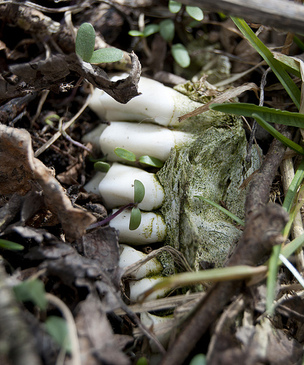
They have buried the unspeakable past, the thick twining mat of tangled stems, dank roots, and swollen tubers, and turned their eyes toward a promise of brilliant scentless blossoms that spring from the air, seedless and rootless, miraculous and immaculate.
But under the rioting colors and noise, the bones by the river, the cracked teeth in the clay speak. Underground, traveling the web of filaments beneath the grass, following traceries of long gone veins and hair, through beads of knuckle and joint and oval eye socket, seeping along the secret pathways of water, the murmur of the bones never stops.
But under the rioting colors and noise, the bones by the river, the cracked teeth in the clay speak. Underground, traveling the web of filaments beneath the grass, following traceries of long gone veins and hair, through beads of knuckle and joint and oval eye socket, seeping along the secret pathways of water, the murmur of the bones never stops.
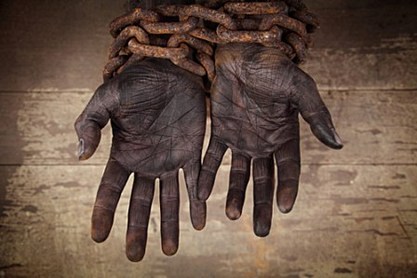
At night, when the bustle of the living grows still, you can hear them: in the ripe shadow of the mango trees, under the blue cobbled streets, in the grey clumps of dried palm fronds. In the river where the gold was sifted and those who waded back empty-handed were maimed, where blades pierced bellies, and bohios burned. By the wall erected over crushed conucos, emptied to fill invaders’ pots. Behind the church door where priests debated who had souls. By the docks where the ships unloaded, and the plaza where the sales were made. In the courtyards where they boiled piles of dirty sheets, and the sheds, still stinking of sweetness, where they lifted razor edged cane to the teeth of the mill. In the field where María fainted from exhaustion in the heat, the batey where Antonio was whipped, the bed where the child Ana was raped.
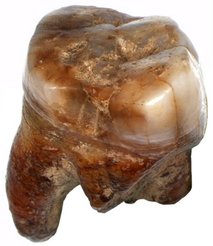
In the old crevices of the city and the shadowed expanses of whispering cane, where the brilliant new lights don't reach, and the song of progress is just a distant noise, the fingers and shinbones of the slaughtered and enslaved gleam like old ivory, clicking and sighing and trading their stories in the dark. It is San Juan de Puerto Rico in the hopeful year of 1897. Each night the children and grandchildren of slaves and slaveholders dream their inheritance of blood, but in the morning, they cannot remember their dreams.
©2012 Aurora Levins Morales
©2012 Aurora Levins Morales